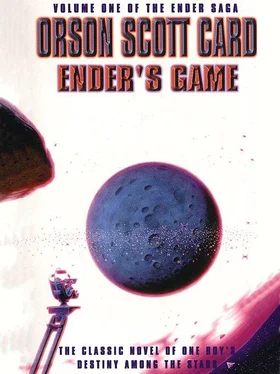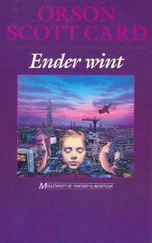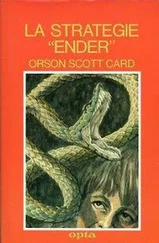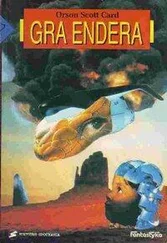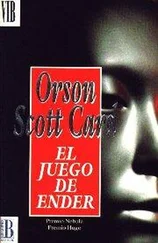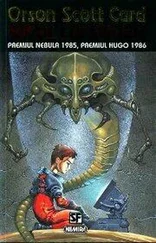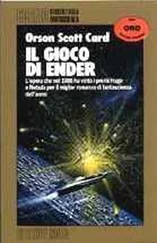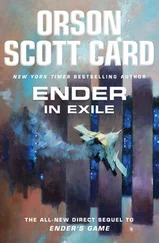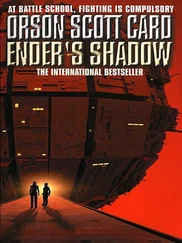The essence of training is to allow error without consequence. Three-dimensional warfare would need to be practiced in an enclosed space, so mistakes wouldn't send trainees flying off to Jupiter. It would need to offer a way to practice shooting without risk of injury; and yet trainees who were "hit" would need to be disabled, at least temporarily. The environment would need to be changeable, to simulate the different conditions of warfare—near a ship, in the midst of debris, near tiny asteroids. And it would need to have some of the confusion of real battle, so that the play-combat didn't evolve into something as rigid and formal as the meaningless marching and maneuvers that still waste an astonishing amount of a trainee's precious hours in basic training in our modem military.
The result of my speculations that morning was the Battle Room, exactly as you will see it (or have already seen it) in this book. It was a good idea, and something like it will certainly be used for training if ever there is a manned military in space. (Something very much like it has already been used in various amusement halls throughout America.)
But, having thought of the Battle Room, I hadn't the faintest idea of how to go about turning the idea into a story. It occurred to me then for the first time that the idea of the story is nothing compared to the importance of knowing how to find a character and a story to tell around that idea. Asimov, having had the idea of paralleling The Decline and Fall , still had no story; his genius—and the soul of the story—came when he personalized his history, making the psychohistorian Hari Seldon the god-figure, the planmaker, the apocalyptic prophet of the story. I had no such character, and no idea of how to make one.
Years passed. I graduated from high school as a junior (just in time—Brigham Young High School was discontinued with the class of 1968) and went on to Brigham Young University. I started there as an archaeology major, but quickly discovered that doing archaeology is unspeakably boring compared to reading die books by Thor Heyerdahl (Aku-Aku, Kon-Tiki), Yigael Yadin (Masada), and James Michener (The Source) that had set me dreaming. Potsherds! Better to be a dentist than to spend your life trying to put together fragments of old pottery in endless desert landscapes in the Middle East.
By the time I realized that not even the semi-science of archaeology was for someone as impatient as me, I was already immersed in my real career. At the time, of course, I misunderstood myself: I thought I was in theatre because I loved performing. And I do love performing don't get me wrong. Give me an audience and I'll hold onto them as long as I can, on any subject. But I'm not a good actor, and theatre was not to be my career. At the time, though, all I cared about was doing plays. Directing them. Building sets and making costumes and putting on makeup for them.
And, above all, rewriting those lousy scripts. I kept thinking, Why couldn't the playwright hear how dull that speech was? This scene could so easily be punched up and made far more effective.
Then I tried my hand at writing adaptations of novels for a reader's theatre class, and my fate was sealed. I was a playwright.
People came to my plays and clapped at the end. I learned—from actors and from audiences—how to shape a scene, how to build tension, and—above all—the necessity of being harsh with your own material, excising or rewriting anything that doesn't work. I learned to separate the story from the writing, probably the most important thing that any storyteller has to learn—that there are a thousand right ways to tell a story, and ten million wrong ones, and you're a lot more likely to find one of the latter than the former your first time through the tale.
My love of theatre lasted through my mission for the LDS Church. Even while I was in São Paulo, Brazil, as a missionary, I wrote a play called Stone Tables about the relationship between Moses and Aaron in the book of Exodus, which had standing-room-only audiences at its premiere (which I didn't attend, since I was still in Brazil!).
At the same time, though, that original impetus to write science fiction persisted.
I had taken fiction writing courses at college, for which I don't think I ever wrote science fiction. But on the side, I had started a series of stories about people with psionic powers (I had no idea this was a sci-fi cliché at the time) that eventually grew into The Worthing Saga. I had even sent one of the stories off to Analog magazine before my mission, and on my mission I wrote several long stories in the same series (as well as a couple of stabs at mainstream stories).
In all that time, the Battle Room remained an idea in the back of my mind. It wasn't until 1975, though, that I dusted it off and tried to write it. By then I had started a theatre company that managed to do reasonably well during the first summer and then collapsed under the weight of bad luck and bad management (myself) during the fall and Winter. I was deeply in debt on the pathetic salary of an editor at BYU Press. Writing was the only thing I knew how to do besides proofreading and editing. It was time to get serious about writing something that might actually earn some money—and, plainly, playwriting wasn't going to be it.
I first rewrote and sent out "Tinker," the first Worthing story I wrote and the one that was still most effective. I got a rejection letter from Ben Bova at Analog, pointing out that "Tinker" simply didn't feel like science fiction—it felt like fantasy. So the Worthing stories were out for the time being.
What was left? The old Battle Room idea. It happened one spring day that a friend of mine, Tammy Mikkelson, was taking her boss's children to the circus in Salt Lake City; would I like to come along? I would. And since there was no ticket for me (and I've always detested the circus anyway—the clowns drive me up a wall), I spent the hours of the performance out on the lawn of the Salt Palace with a notebook on my lap, writing "Ender's Game" as I had written all my plays, in longhand on narrow-ruled paper. "Remember," said Ender. "The enemy's gate is down. "
Maybe it was because of the children in the car on the way up that I decided that the trainees in the Battle Room were so young. Maybe it was because I, barely an adolescent myself, understood only childhood well enough to write about it. Or maybe it was because of something that impressed me in Catton's Army of the Potomac: that the soldiers were all so young and innocent. That they shot and bayoneted the enemy, and then slipped across the neutral ground between armies to trade tobacco, jokes, liquor, and food. Even though it was a deadly game, and the suffering and fear were terrible and real, it was still a game played by children, not all that different from the wargames my brothers and I had played, firing water-filled squirt bottles at each other.
"Ender's Game" was written and sold. I knew it was a strong story because I cared about it and believed in it. I had no idea that it would have the effect it had on the science fiction audience. While most people ignored it, of course, and continue to live full and happy lives without reading it or anything else by me, there was still a surprisingly large group who responded to the story with some fervency.
Ignored on the Nebula ballot. "Ender's Game" got onto the Hugo ballot and came in second. More to the point, I, was awarded the John W. Campbell Award for best new writer. Without doubt, "Ender's Game" wasn't just my first sale—it was the launching pad of my career.
The same story did it again in 1985, when I rewrote it at novel length—the book, now slightly revised, that you are holding in your hands. At that point I thought of Ender's Game, the novel, existing only to set up the much more powerful (I thought) story of Speaker for the Dead. But when I finished the novel, I knew that the story had new strength. I had learned a great deal, about life and about writing, in the decade since I wrote the novelet, and it came together for the first time in this book. Again the audience was kind to me: the Nebula and Hugo awards, foreign translations, and strong, steady sales that, for the first time in my career, actually earned out my advance and allowed me to receive royalties.
Читать дальше
